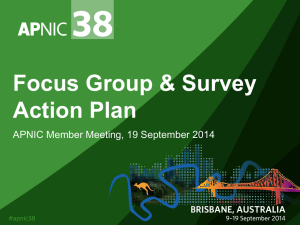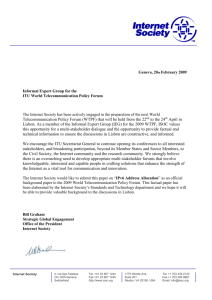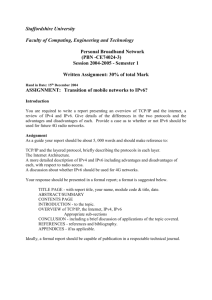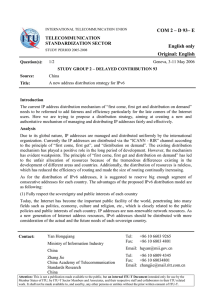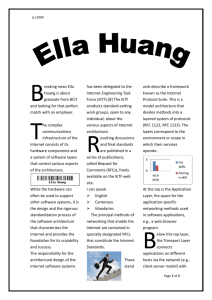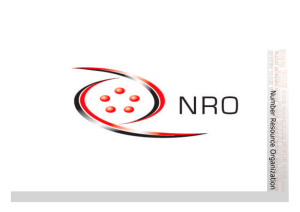ISOC Contribution to ITU Workshop on IPv6 I. Introduction
advertisement
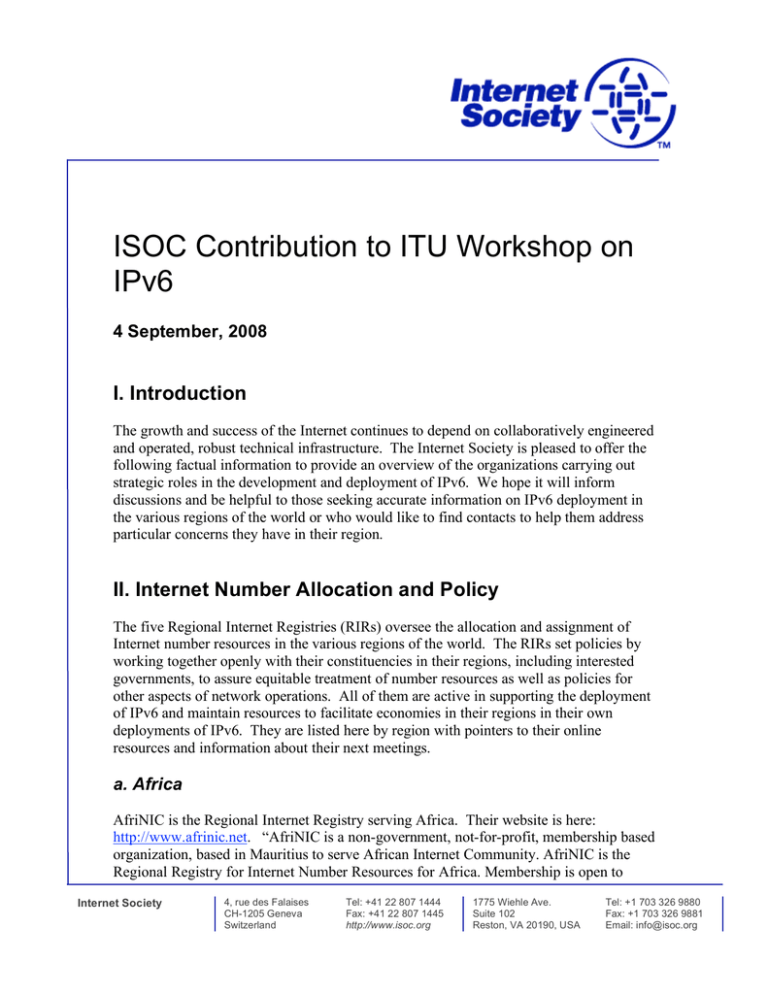
ISOC Contribution to ITU Workshop on IPv6 4 September, 2008 I. Introduction The growth and success of the Internet continues to depend on collaboratively engineered and operated, robust technical infrastructure. The Internet Society is pleased to offer the following factual information to provide an overview of the organizations carrying out strategic roles in the development and deployment of IPv6. We hope it will inform discussions and be helpful to those seeking accurate information on IPv6 deployment in the various regions of the world or who would like to find contacts to help them address particular concerns they have in their region. II. Internet Number Allocation and Policy The five Regional Internet Registries (RIRs) oversee the allocation and assignment of Internet number resources in the various regions of the world. The RIRs set policies by working together openly with their constituencies in their regions, including interested governments, to assure equitable treatment of number resources as well as policies for other aspects of network operations. All of them are active in supporting the deployment of IPv6 and maintain resources to facilitate economies in their regions in their own deployments of IPv6. They are listed here by region with pointers to their online resources and information about their next meetings. a. Africa AfriNIC is the Regional Internet Registry serving Africa. Their website is here: http://www.afrinic.net. “AfriNIC is a non-government, not-for-profit, membership based organization, based in Mauritius to serve African Internet Community. AfriNIC is the Regional Registry for Internet Number Resources for Africa. Membership is open to Internet Society 4, rue des Falaises CH-1205 Geneva Switzerland Tel: +41 22 807 1444 Fax: +41 22 807 1445 http://www.isoc.org 1775 Wiehle Ave. Suite 102 Reston, VA 20190, USA Tel: +1 703 326 9880 Fax: +1 703 326 9881 Email: info@isoc.org anybody.” AfriNIC is an Associate Member of the ITU, in the category of Regional and other International Organizations. They have an IPv6 resource center online with lots of accurate information about IPv6 deployment here: http://www.afrinic.net/IPv6/index.htm. AfriNIC is holding its next public policy meeting (AfriNIC-9) in Addis Ababa, Ethiopia from 22 Nov to 28 Nov 2008. b. Asia-Pacific APNIC is the Regional Internet Registry serving the Asia-Pacific region. Their website is here: http://www.apnic.net. “APNIC is one of five Regional Internet Registries currently operating in the world. It provides allocation and registration services which support the operation of the Internet globally. It is a not-for-profit, membership-based organisation whose members include Internet Service Providers, National Internet Registries, and similar organisations. APNIC represents the Asia Pacific region, comprising 56 economies.” APNIC is an Associate Member of the ITU, in the category of Regional and other International Organizations. They have an IPv6 resource center online with lots of accurate information about IPv6 deployment here: http://www.apnic.net/services/ipv6_guide.html. APNIC is holding its next public policy meeting APNIC-28 in Manila, Philippines from 23 Feb to 27 Feb 2009. c. Europe and the Middle East RIPE NCC is the Regional Internet Registry serving Europe, the Middle East, and parts of Central Asia. Their website is here: http://www.ripe.net. “The RIPE NCC is an independent, not-for-profit membership organisation that supports the infrastructure of the Internet through technical co-ordination in its service region. The most prominent activity of the RIPE NCC is to act as the Regional Internet Registry (RIR) providing global Internet resources and related services (IPv4, IPv6 and AS Number resources) to members in the RIPE NCC service region. The membership consists mainly of Internet Service Providers (ISPs), telecommunication organisations and large corporations located in Europe, the Middle East and parts of Central Asia.” They have lots of accurate information about IPv6 deployment here: http://www.ripe.net/rs/ipv6/index.html. The next RIPE NCC meeting (RIPE-57) will be held in Dubai, UAE from 26 Oct to 30 Oct 2008. d. Latin America LACNIC is the Regional Internet Registry serving Latin America and the Caribbean region. Their website is here: http://www.lacnic.net. “LACNIC is an international nonprofit organization established in October 2002 with headquarters in Uruguay. It is managed by a Board of Directors consisting of six members elected by member organizations.” They have an IPv6 Information Center with pointers to accurate information about IPv6 deployment here: http://www.lacnic.net/ipv6/en/. (LACNIC will be holding its next meeting from 25 May to 29 May 2009 in Panama City, Panama. 4 September 2008 2 e. North America ARIN is the Regional Internet Registry for North America. Their website is here: http://www.arin.net. “Applying the principles of stewardship, ARIN, a non-profit corporation, allocates Internet Protocol resources; develops consensus-based policies; and facilitates the advancement of the Internet through information and educational outreach.” ARIN maintains an IPv6 information center with lots of useful information about IPv6 here: http://www.arin.net/v6/v6-info.html and an IPv6 Wiki page here: http://www.getipv6.info/index.php/Main_Page . The next ARIN meeting will be held in Los Angeles from 15 Oct to 17 Oct 2008. f. The Number Resource Organization (NRO) The Regional Internet Registries formed the NRO is 2003 to formalize their cooperative efforts. The NRO exists to protect the unallocated IP number resource pool, the bottom up policy development process, and act as a focal point for community input to the RIR process. They maintain a website here: http://www.nro.net. III. Internet Number Assignment The Internet Assigned Numbers Authority (IANA), which is currently carried out under contract by the Internet Corporation for Assigned Names and Numbers (ICANN), manages the allocation and maintenance of unique codes and numbers. ICANN is an internationally-organised non-profit organisation set up by the Internet community to help coordinate IANA's areas of responsibilities. The IANA contract does not directly set the policies by which it operates. Instead it provides for implementing agreed policies and principles in a neutral and responsible manner, relying on the policy setting forums provided by ICANN. Policy development for domain name operations and IP addressing is arrived at by many different stakeholders, including governments, through ICANN’s structure of supporting organisations that contribute to deciding how ICANN runs, and in turn how the IANA functions develop. Those involved in the IANA function are actively involved in outreach, not only through ICANN forums, but also through participation in meetings and discussions with TLD operators, Regional Internet Registries, and other relevant communities. They maintain a website here: http://www.iana.org. IV. Standards The development of Internet protocols, which often dictate how protocol assignments should be managed, are arrived at within the Internet Engineering Task Force (IETF), with guidance from the Internet Architecture Board (IAB), through an open, transparent, 4 September 2008 3 bottom-up process open to all interested expert stakeholders. Their websites are here: http://www.ietf.org and http://www.iab.org. Over the past 15 years the IETF has developed the standards that define IPv6. There are on-going working group activities to define operational best practices as well as refinements of ancillary protocols. Working group activity is carried out continuously on via electronic mailing list discussion, and during periodic IETF meetings. The next plenary face to face meeting of IETF engineers will be in Minneapolis, United States, from 16-21 November, 2008. The details of that meeting are here: http://www.ietf.org/meetings/73/. V. Operations There are a number of operational meetings around the world where network operations come together to discuss aspects of the operations of their respective networks within the Internet. These include such organizations as AfNOG, the African Network Operators Group (http://www.afnog.org), NANOG, the North American Network Operators Group (http://www.nanog.org), APRICOT, the Asia Pacific Regional Internet Conference on Operational Technologies (http://www.apricot.net), MENOG, the Middle East Network Operators Group (http://www.menog.net), SANOG, the South Asian Network Operators Group (http://www.sanog.org), and PacNOG, the Pacific Region Network Operators Group (http://www.pacnog.org). VI. The Internet Society The Internet Society (ISOC) is an independent international nonprofit organization with headquarters in Geneva, Switzerland and Reston, Virginia, USA. ISOC acts as a global clearinghouse for technically-sound, unbiased information about the Internet, as a provider of education, and also as a facilitator and coordinator of Internet-related initiatives around the world. It provides the organizational home for the IETF, IAB and IRTF. It was founded in 1992 to provide leadership in Internet related standards, education, and policy around the world. ISOC is an Associate Member of the ITU, in the category of Regional and other International Organizations. They have a website here: http://www.isoc.org and also have lots of useful information about IPv6 here: http://www.isoc.org/educpillar/resources/ipv6.shtml. 4 September 2008 4
